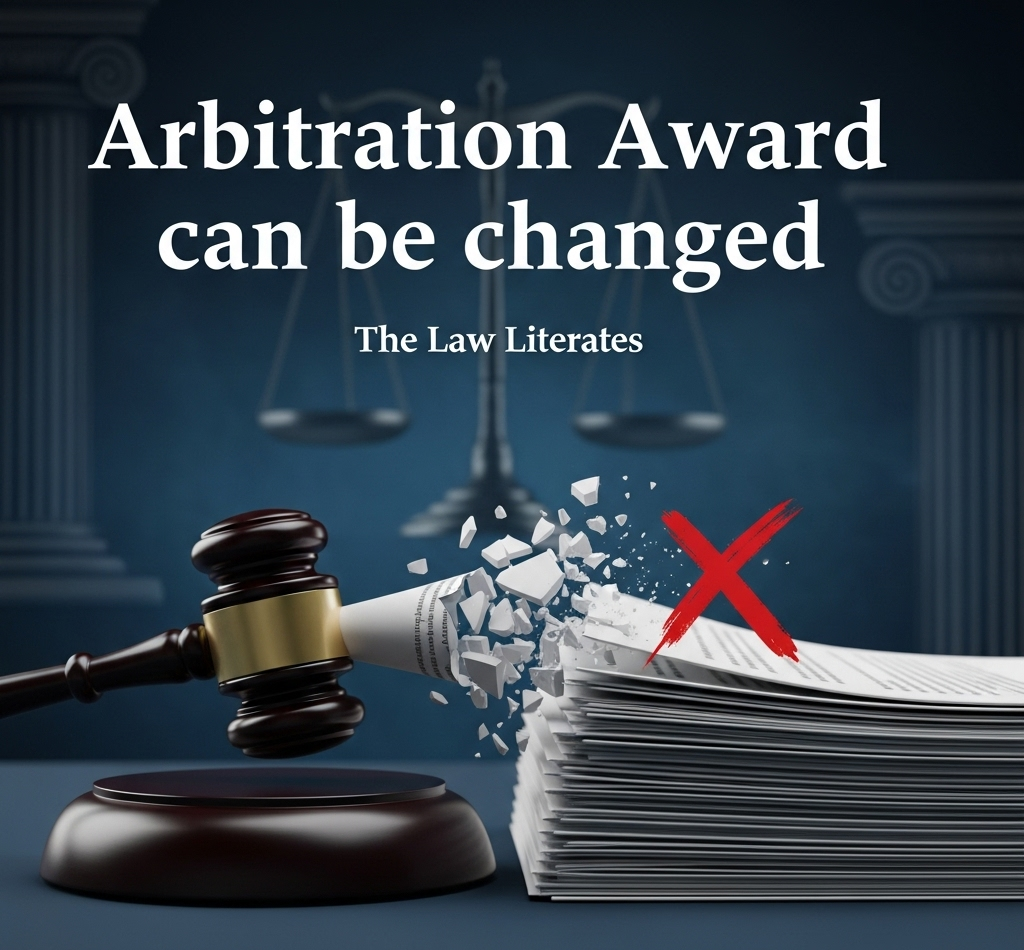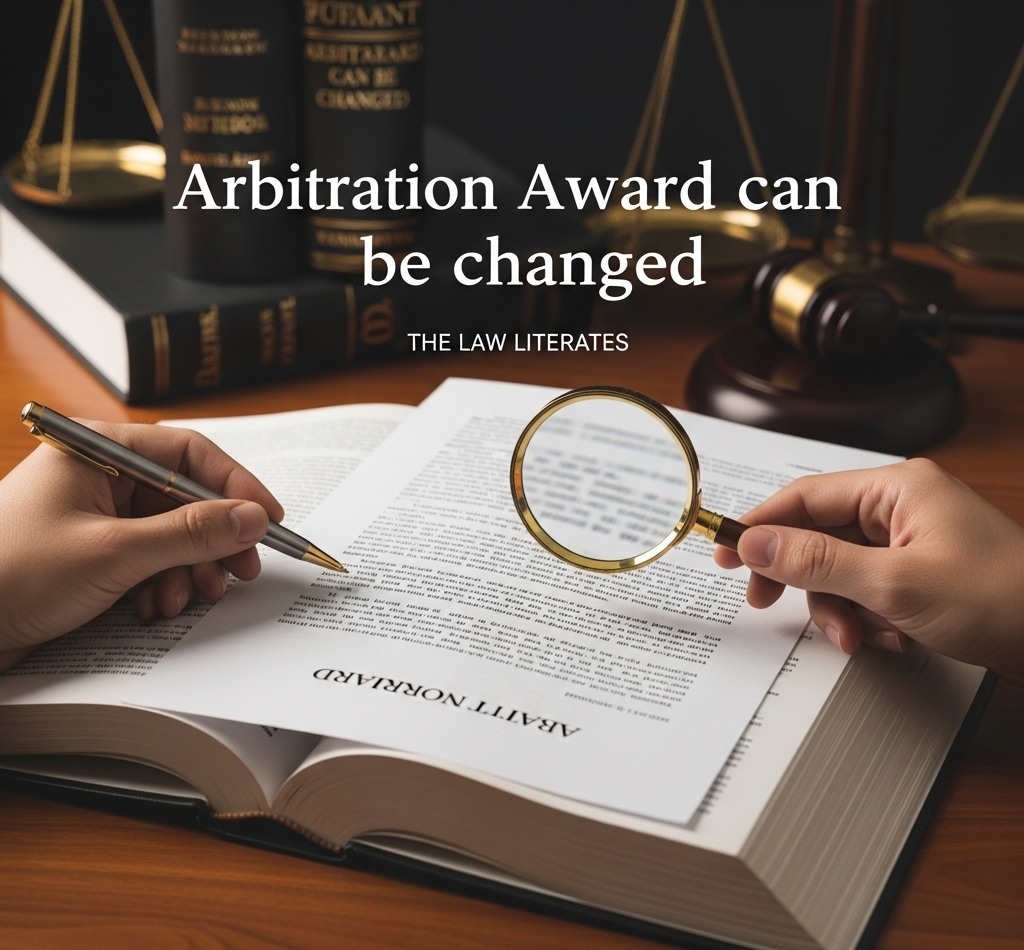Supreme Court Opens the Door to Limited Award Modification – A Measured Shift – The Law Literates
A Measured Shift : Supreme Court Opens the Door to Limited Award Modification
The bedrock and the basis of arbitration is minimal judicial intervention. The Arbitration and Conciliation Act, 1996, envisioned a swift, efficient, and party-centric dispute resolution mechanism, largely insulated from the lengthy procedures of traditional litigation. For years, a core feature of Indian arbitration law has been that courts, when seized with a challenge to an arbitral award under Section 34 of the Act, could either uphold the award or set it aside in its entirety, but not modify it.
This long-standing position, seemingly absolute, has just been re-evaluated and, to a significant extent, nuanced by the Supreme Court of India. The recent landmark decision in Gayatri Balasamy v. M/s ISG Novasoft Technologies Limited (2025 INSC 605), delivered by a 4:1 majority of a Constitution Bench, has redefined the scope of a court’s power under Sections 34 and 37 of the Act, affirming a limited power to modify arbitral awards. This judgment promises to significantly reshape the landscape of arbitration jurisprudence in India.
The Traditional Stance: No Power to Modify
Prior to Gayatri Balasamy, the prevailing judicial view was firmly against the modification of arbitral awards by courts. The rationale was rooted in the legislative intent behind the 1996 Act, which drew heavily from the UNCITRAL Model Law on International Commercial Arbitration. The Model Law emphasizes restrictive judicial interference, providing only for the setting aside of an award, not its modification.
Several pronouncements of the Supreme Court solidified this position:
1. McDermott International Inc. v. Burn Standard Co. Ltd. (2006 (11) SCC 181): This case was often cited for the principle that courts, while exercising powers under Section 34, could not modify an award. The Court clearly stated that the power to set aside an award does not implicitly include the power to modify it.
2.NHAI v. M. Hakeem (2021) 9 SCC 1): This judgment reiterated that Section 34 of the Act does not grant courts the power to modify, vary, or review an arbitral award. The Court underscored that courts could only set aside an award, entirely or partially if severable, but could not venture into rewriting or modifying the arbitrator’s findings. This decision was a strong affirmation of the minimal intervention principle.
3. Ssangyong Engineering and Construction Co. Ltd. v. NHAI (2019 (15) SCC 131): While focusing on “patent illegality,” this case also generally reinforced the limited nature of judicial review under Section 34, leaning away from expansive powers like modification.
The argument against modification was simple: if the legislature intended courts to have the power to modify, it would have explicitly provided for it, as was the case in the erstwhile Arbitration Act, 1940. The omission in the 1996 Act was therefore seen as deliberate.
The Shift in Gayatri Balasamy (2025): A Limited Embrace of Modification
The Gayatri Balasamy case presented a direct challenge to the M. Hakeem precedent, referring the question of a court’s power to modify arbitral awards to a larger bench. The facts of the case involved an employment dispute leading to an arbitration award. The aggrieved party sought modification of the compensation awarded by the tribunal.
The Constitution Bench, by a 4:1 majority, held that while Section 34 of the Act does not expressly provide for modification, a limited power to modify an arbitral award is indeed available to courts in specific circumstances.
The majority reasoned that:
1. “Setting aside in part” implies modification: The Court invoked the legal “maxim omne majus continet in se minus” (the greater contains the less), arguing that if a court has the power to set aside an entire award (the greater power), it inherently possesses the power to set aside a severable part of it, which effectively amounts to a modification of the original award.
2. To prevent re-arbitration and delays: The majority emphasized the practical reality that if a minor, obvious error or an unsustainable portion required the entire award to be set aside, it would compel parties to re-initiate arbitration, leading to significant costs and delays, thereby defeating the very purpose of speedy dispute resolution.
3. Correction of “manifest errors” akin to Section 152 CPC: The Court acknowledged that courts could correct “computational, clerical, or typographical errors, as well as other manifest errors” in an arbitral award. This power was likened to the court’s power to correct accidental slips or omissions in judgments under Section 152 of the Code of Civil Procedure, 1908.
4. Power to modify post-award interest: The judgment explicitly clarified that courts retain the power to modify post-award interest under Section 31(7) of the Act, where the facts justify such modification.
The majority stressed that this power is limited and must be exercised with “care and caution.” It is not a power to re-appreciate evidence, substitute the court’s own findings for those of the arbitrator, or convert the Section 34 proceeding into an appellate review on merits. The modification must be based on grounds already available for setting aside the award under Section 34, where the error is apparent and no further deliberation by the arbitrator is required.

The Dissenting Voice: Upholding Legislative Intent
Justice K.V. Viswanathan, in his sole dissenting opinion, articulated a powerful counter-argument, aligning with the traditional view. He contended that:
1. No express statutory power: The Act does not contain any provision empowering courts to modify awards, unlike the 1940 Act or arbitration statutes in other jurisdictions (e.g., England, Singapore) that explicitly grant such limited powers. The deliberate omission by the Indian legislature signals a clear intent to restrict judicial intervention.
2. Against the spirit of minimal intervention: Reading a power to modify into Section 34 would be antithetical to the core principle of minimal judicial interference that underpins the 1996 Act.
3. Risk of appellate review: Allowing modification, even limited, could inadvertently open the floodgates for parties to seek alterations, blurring the lines between setting aside and appellate review, and prolonging disputes.
4. Alternative remedies exist: If an award suffers from an incurable defect, it can be set aside, and parties are not without recourse as they can commence fresh arbitration, ensuring the finality and binding nature of arbitral awards.
The dissent highlighted the potential for increased challenges and delays in the enforcement of awards if courts start exercising a modification power not explicitly granted by the statute.

Implications and the Way Forward:
The Gayatri Balasamy judgment marks a significant shift, creating a nuanced space for judicial intervention in arbitral awards. Its implications are far-reaching:
1. Reduced delays in certain cases: For awards suffering from easily identifiable and severable defects, the judgment offers a path to rectification without compelling a full re-arbitration, potentially saving time and costs.
2. Increased complexity in Section 34 proceedings: While aiming for efficiency, the nuanced power of modification might lead to more arguments being raised in Section 34 petitions, seeking not just setting aside, but also specific modifications.
3. Clarity on “severability”: The judgment reinforces the importance of the “severability” doctrine, allowing courts to excise only the offending portions of an award without invalidating the entire decision, where possible.
4. Focus on patent and manifest errors: The judgment strongly emphasizes that modification is reserved for errors apparent on the face of the record, not for re-appreciation of evidence or merits.
The Gayatri Balasamy decision is a testament to the Supreme Court’s approach to ensuring justice and efficiency within the arbitration framework. While the dissenting opinion raises valid concerns about legislative intent and potential overreach, the majority view attempts to strike a balance i.e preventing the complete nullification of an otherwise sound award due to a minor, rectifiable error.
To read the Judgment kindly click here :
GAYATRI BALASAMY vs ISG NOVASOFT_Judgement_30-Apr-2025 the law literates
All Rights Reserved (Adv Vaibhav Tomar)

